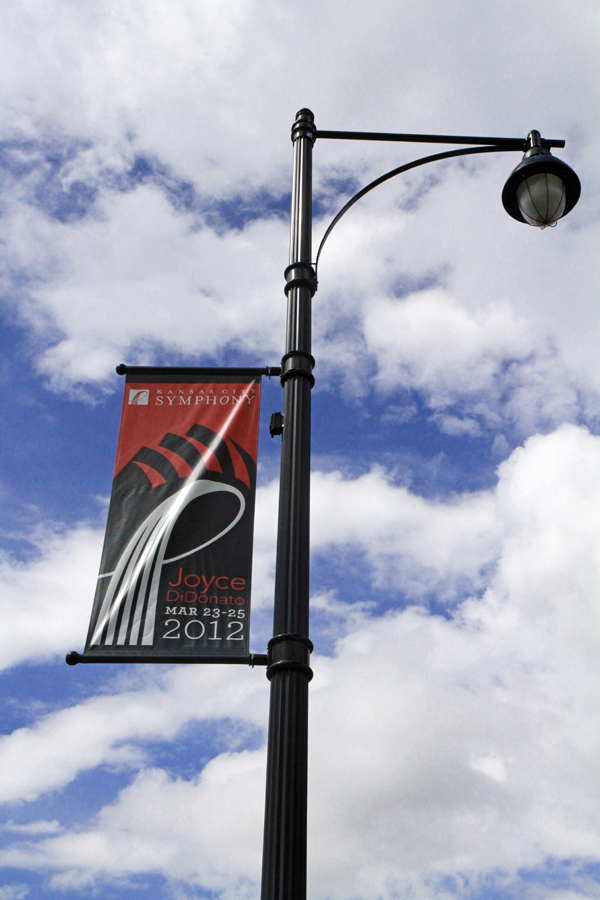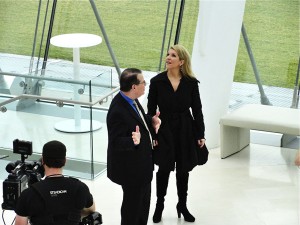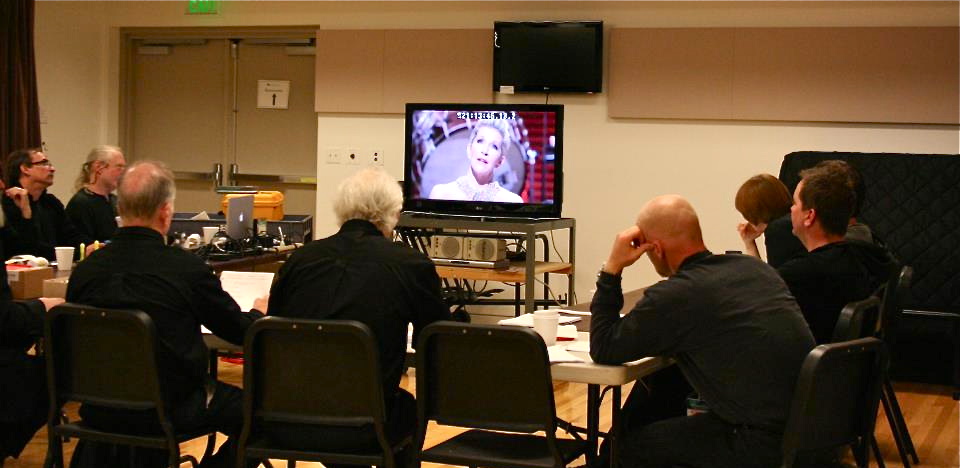Homecoming: The Kansas City Symphony
“This palpable excitement in Helzberg Hall for the monumental concert to come fueled the brilliant evening of new and old works—performed, composed, and interpreted by some of the world’s leading musicians of our time.
Taking stage for the first time, Joyce DiDonato greeted her hometown audience with Rossini’s Giovanna d’Arco. From the work’s first notes, DiDonato was immersed in character. The through-composed, dramatic cantata ran the gamut of technical and emotional demands. As Joan of Arc contemplates her mission at hand, pensive orchestral colors and legato vocal phrasing filled the hall. By the set’s conclusion, however, fireworks erupted onstage as DiDonato executed trumpet-like fanfares at Giovanna d’Arco’s words, “Presto un brando – marciamo pugnando. Viva il Re, la vittoria è con me.” (‘Quick, give me a sword—we’ll march and fight. Long live the King! Victory is mine!’)
The true expertise of DiDonato’s and the Kansas City Symphony’s performance of Giovanna d’Arco shined through their fluidity of dramatic shifts within the piece—one moment, intimate, the next, rousing. DiDonato’s voice was under complete control at all times. The many demands she asked of her instrument in the course of performance were met with ease. The overall collaborative partnership between Stern, DiDonato, and the Kansas City Symphony compelled the audience to stand applauding at the conclusion of the concert’s first half.
Jake Heggie’s 2002 work, The Deepest Desire: Four Meditations on Love, opened the second half. The composer himself, in residence for the weekend concerts, clarified his song cycle’s conception at both the night’s preludial “Concert Comments” as well as immediately preceding his piece’s performance. The work tracked the spiritual transformation of Sister Helen Prejean, whose story Heggie first explored in his opera Dead Man Walking. The opera, he clarified, depicted her physical journey, but The Deepest Desire was her inner, spiritual transformation. The cycle was originally constructed for voice, flute, and piano, but later orchestrated with DiDonato in mind, and this intimate attention to her voice produced a special kind of performance in Kansas City’s Kauffman Center.
Opening much in the vein of Rossini’s cantata, Heggie’s cycle began with an instrumental prelude, “The Call,” in which the motivic theme that constituted the cycle’s entirety was introduced by a beautifully played duet between flute and alto flute. The opening song, “More Is Required,” followed the instrumental introduction. “Love” brought out a color of DiDonato’s voice previously unheard. Her quiet singing of the tender four-lined poem was vulnerable and indescribably human, an effect that resulted in a hushed reverence throughout the house at the song’s conclusion. A light-hearted, almost jazzy, “I Catch on Fire” followed. DiDonato showed her prowess at story-telling in the song, “The Deepest Desire” which explored Sister Helen Prejean’s enlightenment to a higher form of spirituality—indicated musically by a primal climax of sounds, complete with drums, that explored the inner place of spirituality in the human animal. The final song in the cycle, “Primary Colors,” was comprised of pure melodies. The unfolding of the tonally pulchritudinous tunes left the audience breathless in the pause (at least several seconds long) that followed the selection’s final decrescendo of notes—the wild applause that followed brought Heggie, DiDonato, and Stern together onstage.
Gracing the stage once again in a new gown and, in Midwest style, cowboy boots, Joyce DiDonato spoke of the Kauffman Center, lauding Kansas City for its new “majestic temple to music,” a sign that Kansas City was not afraid to dream big and make those dreams happen. A surprise to the audience, who were now ecstatic with anticipation to hear one more piece, DiDonato, the mezzo-soprano from Kansas, concluded the evening with Michael Stern and the Kansas City Symphony with the famous number from The Wizard of Oz, “Somewhere over the Rainbow.” After an already emotional concert, a night Stern called a “happy evening,” the final selection brought the audience to its knees. Circling around herself, DiDonato sang to all angles of the audience, including those behind her in the choir loft, and waved to individuals as she went who ardently waved back.
The concert’s repertoire was well programmed. I anticipated that Heggie’s modern composition would stick out like a sore thumb amidst a sea of late-nineteenth-century Romanticism, but each of the pieces moved logically together by a continuous thread of dramatic, emotional characteristics intrinsic in each work. With performances such as this, Kansas City has permanently raised the standard of its musical scene. Many orchestras and opera companies are failing in current societal and economic conditions across the country, but as Joyce DiDonato, Stern and his Symphony, and Jake Heggie collectively articulated, Kansas City’s stellar displays of the power of music prove that the arts, and music in particular, are still wholly vital experiences in our modern culture.” ~ Tom Marks KC Metropolis March 2012
“Kansas City’s own dazzling mezzo-soprano Joyce DiDonato graced Friday night’s enthusiastic audience with the same redolent, mesmerizing voice that has garnered her an estimable international reputation.
[T]he radiant DiDonato strode onto the stage to the accompaniment of a warm homecoming reception from the Kauffmann audience. She began humbly with Rossini’s rarely-performed Giovanna d’Arco Cantata, which she sang with a warbling, hushed tone that was unspeakably lustrous; her low-register strengths were showcased fully and prominently as well.
DiDonato commands virtually unmatched control over her velvety vocals, having developed the capacity to alter vibrato levels and dynamics dramatically – often to the extent of evoking a skilled string player’s gritty sul ponticello or muted con sordino.
As an encore, DiDonato returned to the stage for an appropriately Kansas Citian encore: “Somewhere Over the Rainbow.” Her sensitively rendered operatic version betrayed the joy that she had earlier communicated to Friday night’s audience about returning home at long last – while the reception she received at the evening’s conclusion, in turn, betrayed the audience’s joy at having her back.” ~ Erin Hales The Independent March 2012
“When Joyce DiDonato comes to town it’s not just an event worth attending. It’s a cause for celebration. The world-famous mezzo-soprano performed with Kansas City Symphony on Friday night at Helzberg Hall, living up to her stellar reputation as one of the world’s premier vocalists.
The star displayed her civic pride Friday by commenting on the new Kauffman Center for the Performing Arts. “I’ve been hearing about this majestic temple of music from afar,” DiDonato said. “This has exceeded every expectation I had.”
DiDonato presented music that was sublime and profound. While she is best known for her operatic roles in Gioachino Rossini’s “La Cenerentola (Cinderella)” and “Il Barbiere di Siviglia (The Barber of Seville),” the singer turned to “Giovanna d’Arco (Joan of Arc),” a lesser-known cantata by the composer.
Even during the orchestral opening, DiDonato was in character, contemplative and emotive with her facial expressions. Throughout the work, the mezzo exhibited great tonal beauty, astonishing lyricism and expression. Her lower register was solid and resonant, while the upper range was vibrant and rich. The ornamental passages with their rapid runs were especially striking.” ~ Timothy McDonald Kansas City Star March 2012


